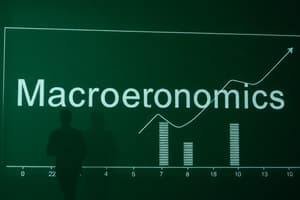Podcast
Questions and Answers
Which economic principle addresses the necessity of making choices due to limited resources?
Which economic principle addresses the necessity of making choices due to limited resources?
- Supply and Demand
- Scarcity (correct)
- Marginal Analysis
- Opportunity Cost
What best describes a market economy?
What best describes a market economy?
- Community-owned resources managed collectively
- Decisions driven by supply and demand (correct)
- Private ownership with government regulation
- Centralized decision-making for production
Which theory emphasizes the necessity of government intervention to stimulate demand during economic downturns?
Which theory emphasizes the necessity of government intervention to stimulate demand during economic downturns?
- Keynesian Economics (correct)
- Classical Economics
- Supply-Side Economics
- Monetarism
Which economic indicator reflects the general level of prices for goods and services in an economy?
Which economic indicator reflects the general level of prices for goods and services in an economy?
What does marginal analysis evaluate in economic decision-making?
What does marginal analysis evaluate in economic decision-making?
Which model illustrates the flow of money between households and firms in an economy?
Which model illustrates the flow of money between households and firms in an economy?
What is a key characteristic of a planned economy?
What is a key characteristic of a planned economy?
Which of the following is NOT typically associated with Classical Economics?
Which of the following is NOT typically associated with Classical Economics?
Flashcards are hidden until you start studying
Study Notes
Key Concepts in Economics
- Definition: Economics is the study of how individuals, firms, and societies allocate scarce resources to satisfy their wants and needs.
Main Branches of Economics
-
Microeconomics:
- Focuses on individual agents, such as consumers and businesses.
- Analyzes supply and demand, price formation, and competition.
- Studies market structures (perfect competition, monopolies, oligopolies).
-
Macroeconomics:
- Examines the economy as a whole.
- Focuses on aggregate indicators (GDP, inflation, unemployment).
- Analyzes government policies, fiscal and monetary policy.
Economic Principles
- Scarcity: Limited resources versus unlimited wants leads to the necessity of choice.
- Opportunity Cost: The value of the next best alternative forgone when making a choice.
- Supply and Demand: The relationship between the availability of goods and the desire for them.
- Marginal Analysis: Evaluates the additional benefits of an activity compared to the additional costs.
Types of Economic Systems
- Market Economy:
- Decisions driven by supply and demand.
- Private ownership of resources.
- Planned Economy:
- Central authority makes production and distribution decisions.
- Common in socialist countries.
- Mixed Economy:
- Combination of market and planned economies.
- Elements of both private and government control.
Economic Indicators
- Gross Domestic Product (GDP): Total value of goods and services produced in a country.
- Inflation Rate: The rate at which the general level of prices for goods and services rises.
- Unemployment Rate: Percentage of the labor force that is jobless but seeking employment.
Key Theories in Economics
- Classical Economics: Advocates for free markets and minimal government intervention. Assumes that markets are self-correcting.
- Keynesian Economics: Emphasizes the role of government intervention during economic downturns to stimulate demand.
- Supply-Side Economics: Focuses on boosting economic growth by increasing supply of goods and services, often through tax cuts.
Important Models
- Circular Flow Model: Illustrates how money flows through the economy between households and firms.
- Phillips Curve: Shows the inverse relationship between inflation and unemployment.
Policy Tools
- Monetary Policy: Managed by central banks; controls money supply and interest rates to influence economic activity.
- Fiscal Policy: Government spending and tax policies used to influence economic conditions.
Current Economic Topics
- Globalization: The increasing interdependence of world economies through trade and investment.
- Economic Inequality: The disparity in income and wealth distribution among individuals or groups.
- Sustainability: Economic practices that aim to meet current needs without compromising future generations' ability to meet theirs.
Economics Definition
- The study of how individuals, businesses, and societies allocate limited resources to meet their wants and needs.
Branches of Economics
- Microeconomics: Focuses on individual decision-makers, such as consumers and businesses. Analyzes topics like supply and demand, price determination, and market competition.
- Macroeconomics: Examines the economy as a whole, analyzing factors such as GDP, inflation, and unemployment. Focuses on government policies for managing the overall economy.
Economic Principles
- Scarcity: Limited resources and unlimited wants lead to the necessity of making choices.
- Opportunity Cost: The value of what you give up when making a choice. This is the next best alternative foregone.
- Supply and Demand: How much is available (supply) and how much people want it (demand) determine the price of goods and services.
- Marginal Analysis: Helps us decide how much of something to do by comparing the additional benefits to the additional costs.
Economic Systems
- Market Economy: Driven by the forces of supply and demand, with private ownership of resources.
- Planned Economy: Central authority makes decisions about production and distribution. Found in some socialist countries.
- Mixed Economy: Combines aspects of both market and planned economies. There is both private ownership and government control.
Economic Indicators
- Gross Domestic Product (GDP): The total value of goods and services produced within a country during a specific time period.
- Inflation Rate: Measures how quickly the general level of prices for goods and services is rising.
- Unemployment Rate: The percentage of the labor force that is actively seeking employment but cannot find a job.
Key Economic Theories
- Classical Economics: Advocates for free markets and limited government involvement. Assumes that markets can self-correct.
- Keynesian Economics: Emphasizes the role of government intervention during economic downturns to stimulate demand.
- Supply-Side Economics: Focuses on increasing economic growth by boosting the supply of goods and services, often through tax cuts.
Important Economic Models
- Circular Flow Model: Shows how money moves through the economy between households and businesses.
- Phillips Curve: Illustrates the relationship between inflation and unemployment.
Economic Policy Tools
- Monetary Policy: Controlled by central banks. This involves adjusting the money supply and interest rates to influence economic activity.
- Fiscal Policy: The use of government spending and tax policies to influence economic conditions.
Current Economic Topics
- Globalization: The increasing interdependence of economies worldwide through trade and investments.
- Economic Inequality: The disparity in income and wealth distribution among individuals or groups.
- Sustainability: Economic practices that aim to meet current needs without compromising future generations' ability to meet theirs.
Studying That Suits You
Use AI to generate personalized quizzes and flashcards to suit your learning preferences.




